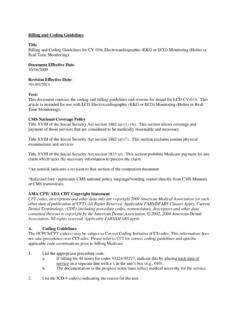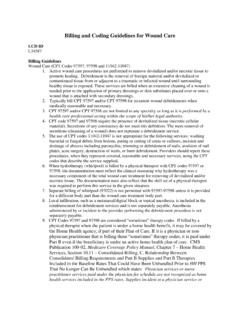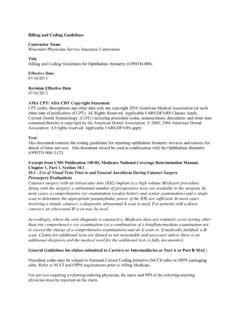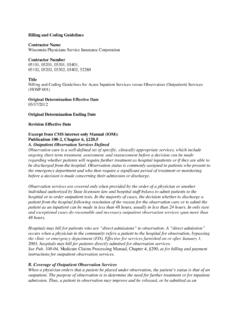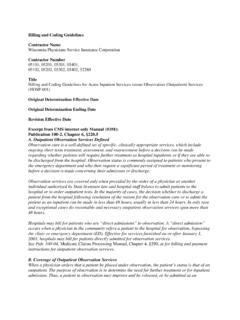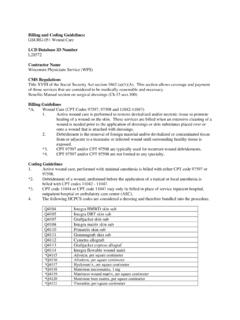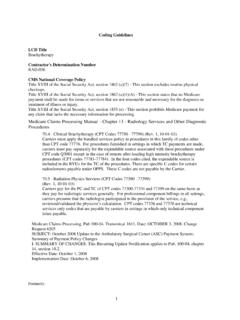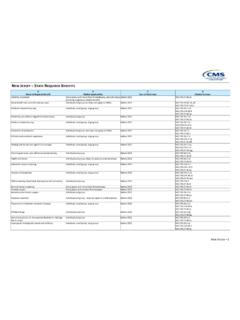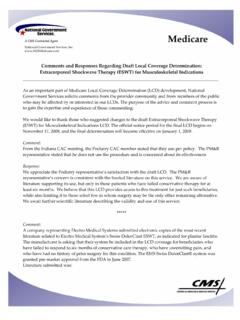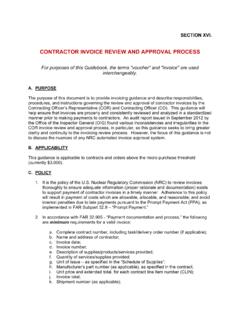Transcription of Billing and Coding Guidelines Psychological and ...
1 Billing and Coding Guidelines Psychological and Neuropsychological Testing L34646 See (CMS Publication 100-02; Medicare Benefit Policy Manual, Chapter 15- Covered Medical and Other Health Services: Psychological and Neuropsychological Tests Medicare Part B coverage of Psychological tests and neuropsychological tests is authorized under section 1861(s)(3) of the Social Security Act. Payment for Psychological and neuropsychological tests is authorized under section 1842(b)(2)(A) of the Social Security Act. The payment amounts for the new Psychological and neuropsychological tests (CPT codes 96102, 96103, 96119 and 96120) that are effective January 1, 2006, and are billed for tests administered by a technician or a computer reflect a site of service payment differential for the facility and non-facility settings. Additionally, there is no authorization for payment for diagnostic tests when performed on an incident to basis.)
2 Under the diagnostic tests provision, all diagnostic tests are assigned a certain level of supervision. Generally, regulations governing the diagnostic tests provision require that only physicians can provide the assigned level of supervision for diagnostic tests. However, there is a regulatory exception to the supervision requirement for diagnostic Psychological and neuropsychological tests in terms of who can provide the supervision. That is, regulations allow a clinical psychologist (CP) or a physician to perform the general supervision assigned to diagnostic Psychological and neuropsychological tests. In addition, nonphysician practitioners such as nurse practitioners (NPs), clinical nurse specialists (CNSs) and physician assistants (PAs) who personally perform diagnostic Psychological and neuropsychological tests are excluded from having to perform these tests under the general supervision of a physician or a CP.
3 Rather, NPs and CNSs must perform such tests under the requirements of their respective benefit instead of the requirements for diagnostic Psychological and neuropsychological tests. Accordingly, NPs and CNSs must perform tests in collaboration (as defined under Medicare law at section 1861(aa)(6) of the Act) with a physician. PAs perform tests under the general supervision of a physician as required for services furnished under the PA benefit. Furthermore, physical therapists (PTs), occupational therapists (OTs) and speech language pathologists (SLPs) are authorized to bill three test codes as sometimes therapy codes. Specifically, CPT codes 96105, and 96111 may be performed by these therapists. However, when PTs, OTs and SLPs perform these three tests, they must be performed under the general supervision of a physician or a CP. Who May Bill for Diagnostic Psychological and Neuropsychological Tests CPs see qualifications under chapter 15, section 160 of the Benefits Policy Manual, Pub.
4 100-02. NPs to the extent authorized under State scope of practice. See qualifications under chapter 15, section 200 of the Benefits Policy Manual, Pub. 100-02. CNSs to the extent authorized under State scope of practice. See qualifications under chapter 15, section 210 of the Benefits Policy Manual, Pub. 100-02. PAs to the extent authorized under State scope of practice. See qualifications under chapter 15, section 190 of the Benefits Policy Manual, Pub. 100-02. Independently Practicing Psychologists (IPPs) PTs, OTs and SLPs see qualifications under chapter 15, sections of the Benefits Policy Manual, Pub. 100-02. Psychological and neuropsychological tests performed by a psychologist (who is not a CP) practicing independently of an institution, agency, or physician s office are covered when a physician orders such tests. An IPP is any psychologist who is licensed or certified to practice psychology in the State or jurisdiction where furnishing services or, if the jurisdiction does not issue licenses, if provided by any practicing psychologist.
5 (It is CMS understanding that all States, the District of Columbia, and Puerto Rico license psychologists, but that some trust territories do not. Examples of psychologists, other than CPs, whose Psychological and neuropsychological tests are covered under the diagnostic tests provision include, but are not limited to, educational psychologists and counseling psychologists.) The carrier must secure from the appropriate State agency a current listing of psychologists holding the required credentials to determine whether the tests of a particular IPP are covered under Part B in States that have statutory licensure or certification. In States or territories that lack statutory licensing or certification, the carrier checks individual qualifications before provider numbers are issued. Possible reference sources are the national directory of membership of the American Psychological Association, which provides data about the educational background of individuals and indicates which members are board-certified, the records and directories of the State or territorial Psychological association, and the National Register of Health Service Providers.
6 If qualification is dependent on a doctoral degree from a currently accredited program, the carrier verifies the date of accreditation of the school involved, since such accreditation is not retroactive. If the listed reference sources do not provide enough information ( , the psychologist is not a member of one of these sources), the carrier contacts the psychologist personally for the required information. Generally, carriers maintain a continuing list of psychologists whose qualifications have been verified. NOTE: When diagnostic Psychological tests are performed by a psychologist who is not practicing independently, but is on the staff of an institution, agency, or clinic, that entity bills for the Psychological tests. The carrier considers psychologists as practicing independently when: 1. They render services on their own responsibility, free of the administrative and professional control of an employer such as a physician, institution or agency; 2.
7 The persons they treat are their own patients; and 3. They have the right to bill directly, collect and retain the fee for their services. A psychologist practicing in an office located in an institution may be considered an independently practicing psychologist when both of the following conditions exist: 1. The office is confined to a separately-identified part of the facility which is used solely as the psychologist s office and cannot be construed as extending throughout the entire institution; and 2. The psychologist conducts a private practice, , services are rendered to patients from outside the institution as well as to institutional patients. Payment for Diagnostic Psychological and Neuropsychological Tests Expenses for diagnostic Psychological and neuropsychological tests are not subject to the outpatient mental health treatment limitation, that is, the payment limitation on treatment services for mental, psychoneurotic and personality disorders as authorized under Section 1833(c) of the Act.
8 The payment amount for the new Psychological and neuropsychological tests (CPT codes 96102, 96103, 96119 and 96120) that are billed for tests performed by a technician or a computer reflect a site of service payment differential for the facility and non-facility settings. CPs, NPs, CNSs and PAs are required by law to accept assigned payment for Psychological and neuropsychological tests. However, while IPPs are not required by law to accept assigned payment for these tests, they must report the name and address of the physician who ordered the test on the claim form when Billing for tests. CPT Codes for Diagnostic Psychological and Neuropsychological Tests The range of CPT codes used to report Psychological and neuropsychological tests is 96101-96120. CPT codes 96101, 96102, 96103, 96105, and 96111 are appropriate for use when Billing for Psychological tests. CPT codes 96116, 96118, 96119 and 96120 are appropriate for use when Billing for neuropsychological tests.
9 All of the tests under this CPT code range 96101-96120 are indicated as active codes under the physician fee schedule database and are covered if medically necessary. Payment and Billing Guidelines for Psychological and Neuropsychological Tests The technician and computer CPT codes for Psychological and neuropsychological tests include practice expense, malpractice expense and professional work relative value units. Accordingly, CPT Psychological test code 96101 should not be paid when billed for the same tests or services performed under Psychological test codes 96102 or 96103. CPT neuropsychological test code 96118 should not be paid when billed for the same tests or services performed under neuropsychological test codes 96119 or 96120. However, CPT codes 96101 and 96118 can be paid separately on the rare occasion when billed on the same date of service for different and separate tests from 96102, 96103, 96119 and 96120.
10 Under the physician fee schedule, there is no payment for services performed by students or trainees. Accordingly, Medicare does not pay for services represented by CPT codes 96102 and 96119 when performed by a student or a trainee. However, the presence of a student or a trainee while the test is being administered does not prevent a physician, CP, IPP, NP, CNS or PA from performing and being paid for the Psychological test under 96102 or the neuropsychological test under 96119. Text: Psychological and Neuropsychological Testing are diagnostic procedures that must be used as an important tool in making specific diagnoses or prognoses to aid in treatment planning and to address questions regarding treatment goals, efficacy, and patient disposition. Diagnostic procedures that have no impact on a patient s plan of care or have no effect on treatment are not medically necessary. The CPT Codes discussed in this LCD and Billing and Coding Guidelines are used to report the services provided during testing of the cognitive function of the central nervous system.
